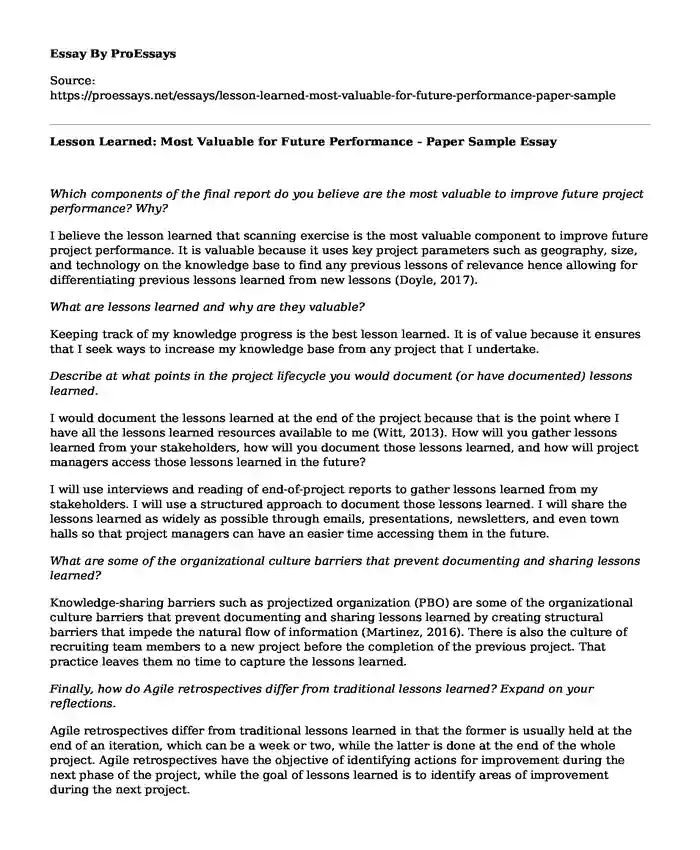Which components of the final report do you believe are the most valuable to improve future project performance? Why?
I believe the lesson learned that scanning exercise is the most valuable component to improve future project performance. It is valuable because it uses key project parameters such as geography, size, and technology on the knowledge base to find any previous lessons of relevance hence allowing for differentiating previous lessons learned from new lessons (Doyle, 2017).
What are lessons learned and why are they valuable?
Keeping track of my knowledge progress is the best lesson learned. It is of value because it ensures that I seek ways to increase my knowledge base from any project that I undertake.
Describe at what points in the project lifecycle you would document (or have documented) lessons learned.
I would document the lessons learned at the end of the project because that is the point where I have all the lessons learned resources available to me (Witt, 2013). How will you gather lessons learned from your stakeholders, how will you document those lessons learned, and how will project managers access those lessons learned in the future?
I will use interviews and reading of end-of-project reports to gather lessons learned from my stakeholders. I will use a structured approach to document those lessons learned. I will share the lessons learned as widely as possible through emails, presentations, newsletters, and even town halls so that project managers can have an easier time accessing them in the future.
What are some of the organizational culture barriers that prevent documenting and sharing lessons learned?
Knowledge-sharing barriers such as projectized organization (PBO) are some of the organizational culture barriers that prevent documenting and sharing lessons learned by creating structural barriers that impede the natural flow of information (Martinez, 2016). There is also the culture of recruiting team members to a new project before the completion of the previous project. That practice leaves them no time to capture the lessons learned.
Finally, how do Agile retrospectives differ from traditional lessons learned? Expand on your reflections.
Agile retrospectives differ from traditional lessons learned in that the former is usually held at the end of an iteration, which can be a week or two, while the latter is done at the end of the whole project. Agile retrospectives have the objective of identifying actions for improvement during the next phase of the project, while the goal of lessons learned is to identify areas of improvement during the next project.
References
Doyle, P. (2017, October 18). Getting the Most from Lessons Learned. https://www.projectmanagement.com/articles/411279/Getting-the-Most-from-Lessons-Learned.
Witt, J. (2013, September 30). How to Capture Lessons Learned at the End of a Project. [Video]. YouTube. https://www.youtube.com/watch?v=DBUqW_ek4hI
Martínez. S. M. (2016). Overcoming Knowledge-Sharing Barriers. Paper presented at PMI® Global Congress 2016—EMEA, Barcelona, Spain. Newtown Square, PA: Project Management Institute. https://owl.purdue.edu/owl/research_and_citation/apa_style/apa_formatting_and_style_guide/reference_list_electronic_sources.html
Cite this page
Lesson Learned: Most Valuable for Future Performance - Paper Sample. (2023, Nov 02). Retrieved from https://proessays.net/essays/lesson-learned-most-valuable-for-future-performance-paper-sample
If you are the original author of this essay and no longer wish to have it published on the ProEssays website, please click below to request its removal:
- Investigating Leadership, Gender, and Coaching Level Using the Revised Leadership for Sports Scale
- Paper Example on Workplace Anxiety
- Economic Decision Makers in General Motors Essay Example
- House Market Crash of 2008: How Lack of Regulatory Oversight Led to the Crisis
- Leadership Practice Concepts - Research Paper
- Essay Sample on Leading a Team of Social Workers to Help War Victims
- Paper Example on ACTWU Organizing Effort: SGA Industries Crisis







